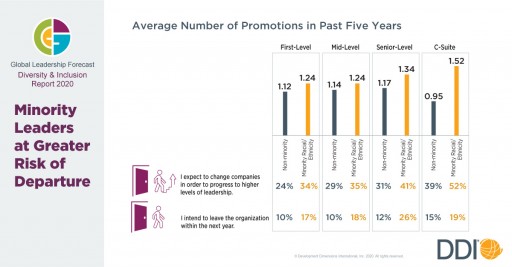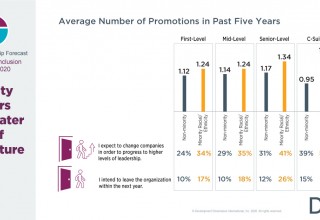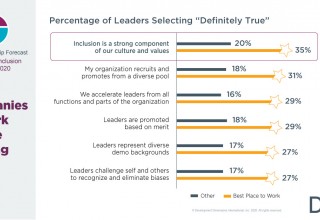
PITTSBURGH - October 28, 2020 - (Newswire.com)
Senior minority executives plan to leave their current position at twice the normal rate of other executives. And this exodus could be coming within the next year, according to DDI's Diversity and Inclusion Report 2020.
This is just one finding from the report, which is part of the Global Leadership Forecast series by DDI. The report includes data from 15,787 leaders and 2,102 human resources professionals. These leaders represent more than 1,740 organizations across more than 25 industries globally. The report delivers data on gender and racial/ethnic diversity among leaders, and its effect on companies' financial results. Companies can use the data to help guide their diversity and inclusion efforts, as well as their talent strategy.
"While leaders from diverse ethnic and racial backgrounds are finally advancing at a faster rate, our study showed that organizations face high retention risks for these leaders," said Stephanie Neal, director of DDI's Center for Analytics and Behavioral Research. "It's likely that these leaders still face significant barriers as they move up the ladder, which may be why they feel like they have to leave the company to advance. Companies should be paying close attention to how inclusive their culture and talent practices are to ensure they retain these diverse and highly talented leaders."
The study found that fewer than one in four leaders reported their organization consistently recruits and promotes from a diverse talent pool. Furthermore, only 27 percent of leaders believe inclusion is a strong part of their organizations' culture and values.
The Diversity and Inclusion Report 2020 found that while organizations are working to build more diverse and inclusive workforces, there are still gaps that need to be addressed. The study also found:
- Diversity has a greater impact on financial performance than any other organizational demographic factor. Organizations with above-average gender, racial and ethnic diversity had at least 30 percent of women and 20 percent of leaders from diverse racial and ethnic backgrounds in leadership roles. These organizations were eight times more likely to be in the top 10 percent of organizations for financial performance.
- Leaders from minority backgrounds are more likely to feel the need to change companies to progress their career across all leadership levels. Also, they were much more likely to say they plan to leave within the next year. This is especially true among senior-level minority leaders, who are more than twice as likely to leave as their non-minority peers.
- Diversity and inclusion efforts resonate across organizations' entire workforce. More than one-third of leaders from companies that qualify as "Best Places to Work" reported that inclusion is a strong component of their work culture and value. This is in comparison to the 20 percent of leaders from other companies without the same label.
- Organizations with more diversity in high-potential pools typically see higher financial performance. Organizations in the top 10 percent of financial performance report that women make up 24 percent of their high-potential pool, and 19 percent are from diverse racial and ethnic backgrounds. Organizations with below average financial performance report less diversity in their high-potential pools. Their pools include only 16 percent women and 12 percent from diverse racial and ethnic backgrounds.
- Women continue to struggle to advance. At higher levels of leadership, women indicated an increasing need to switch companies to climb higher in their roles. In fact, 45 percent of women executives said they would likely need to switch companies to advance, compared to only 32 percent of male executives.
"There's a clear bottom-line benefit to workplace diversity and inclusion, and organizations can only benefit from increasing these efforts," Neal said. "It's important that leaders take the time to assess the state of diversity and inclusion in their organization and employ best practices if they want to realize the benefits of a diverse and inclusive workforce."
For more information, including the full report, visit ddiworld.com/research/inclusion-report.
###
About DDI
DDI is a global leadership consulting firm that helps organizations hire, promote and develop exceptional leaders. From first-time managers to C-suite executives, DDI is by leaders' sides, supporting them in every critical moment of leadership. Built on five decades of research and experience in the science of leadership, DDI's evidence-based assessment and development solutions enable millions of leaders around the world to succeed, propelling their organizations to new heights. For more information, visit ddiworld.com.
Available for Interviews
Stephanie Neal, director of DDI's Center for Analytics and Behavioral Research
Contact:
Brad Pedersen
PR Specialist, DDI
Brad.Pedersen@ddiworld.com
412-485-9767
Related Images


Press Release Service by Newswire.com
Original Source: New DDI Study Reveals Minority Leaders Getting More Promotions, But More Likely to Switch Companies to Advance

